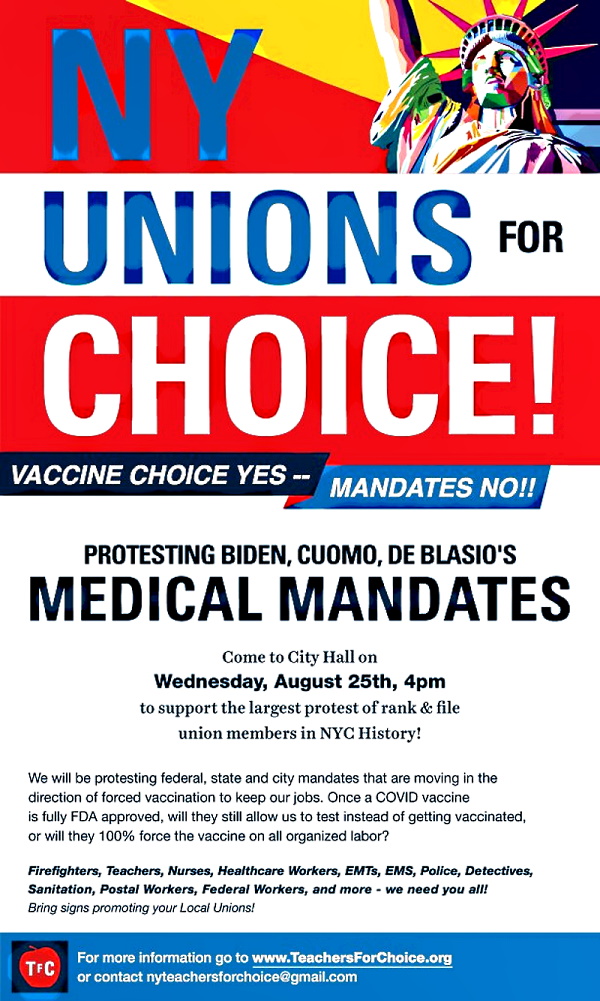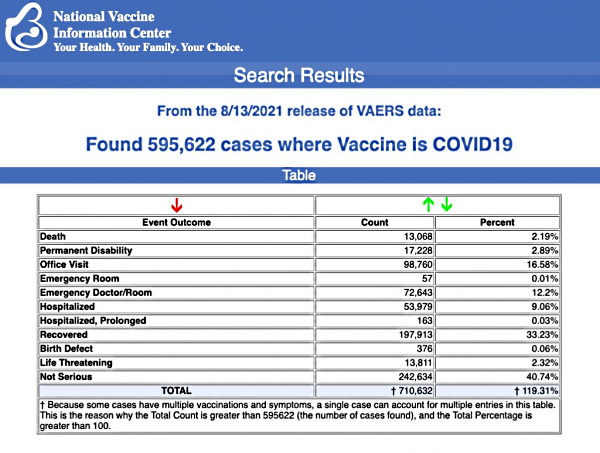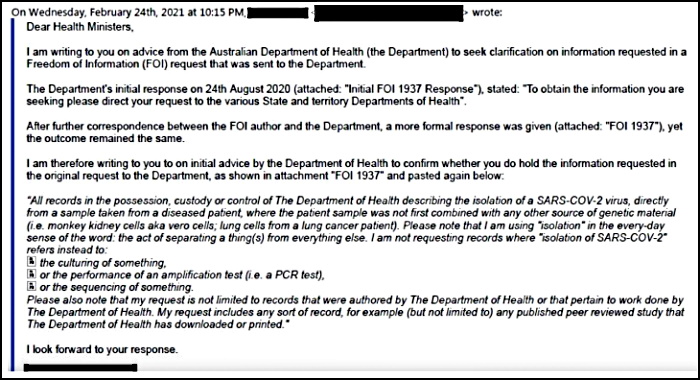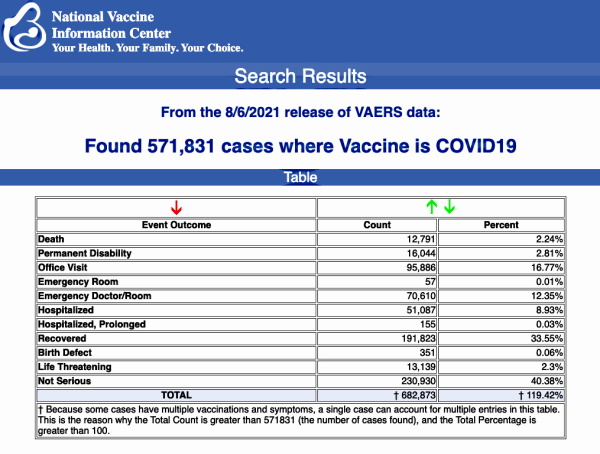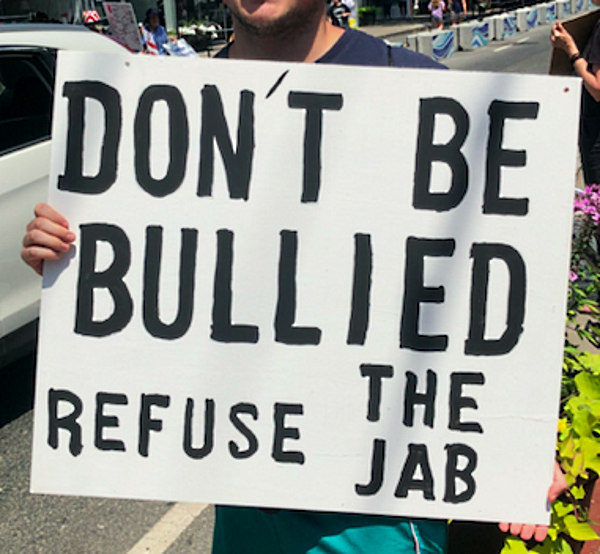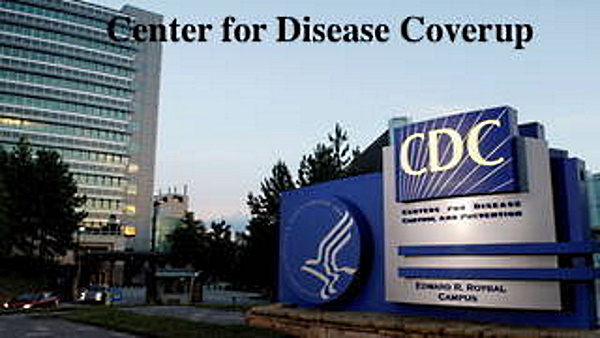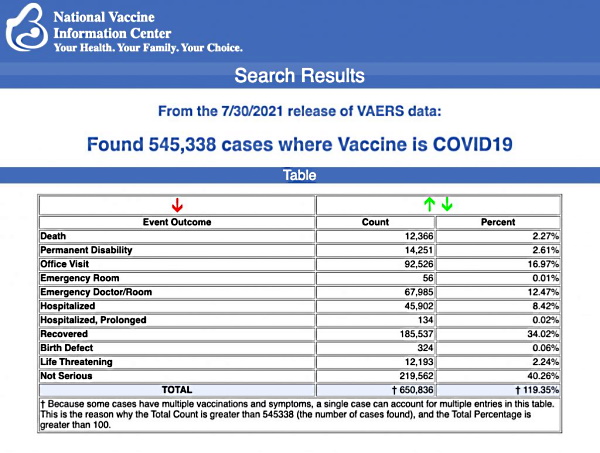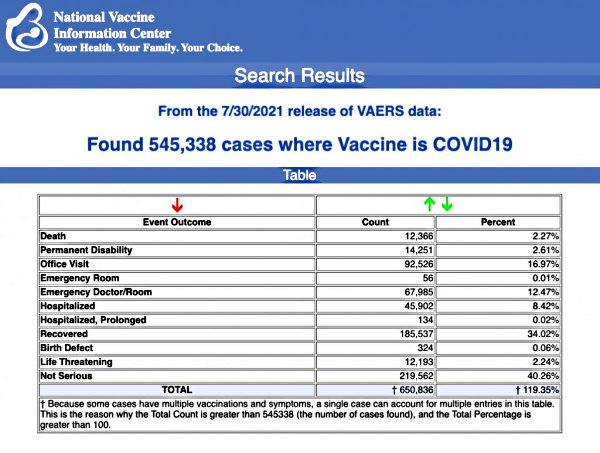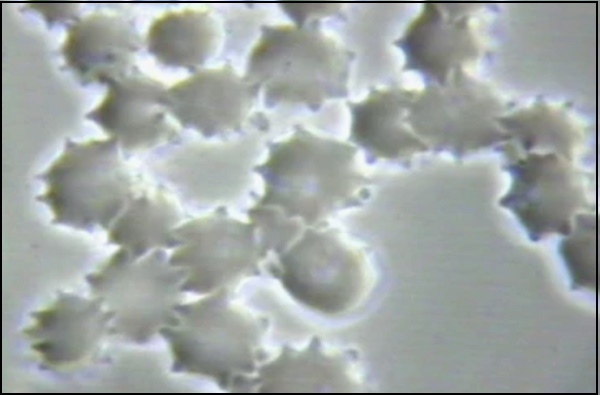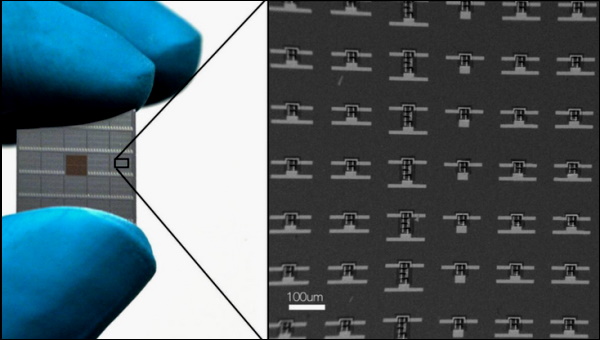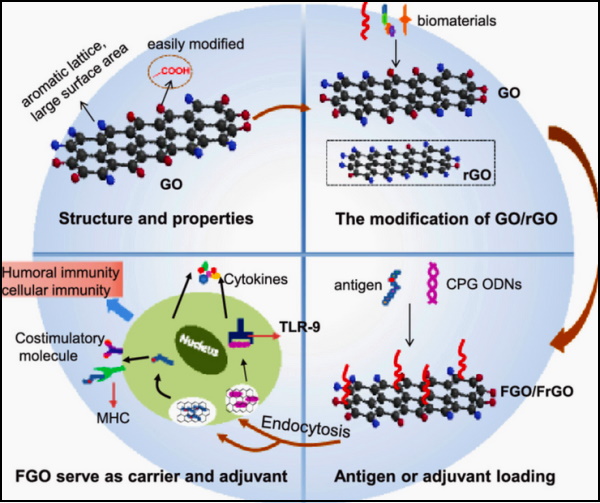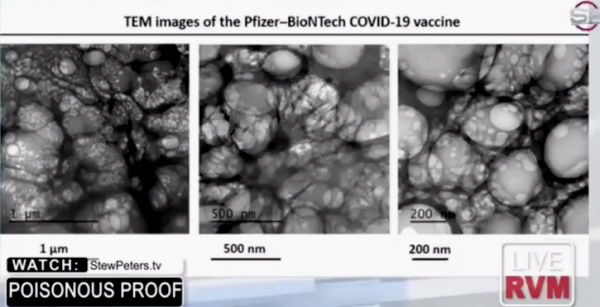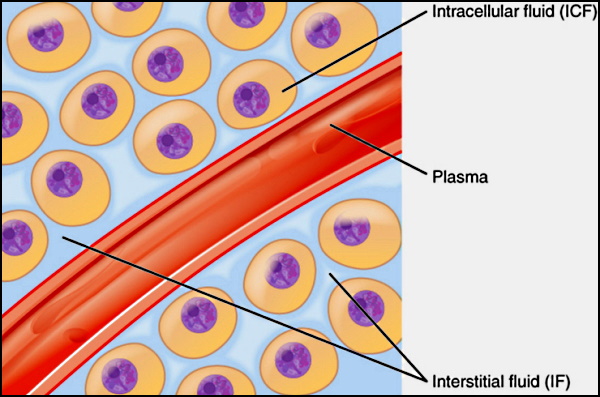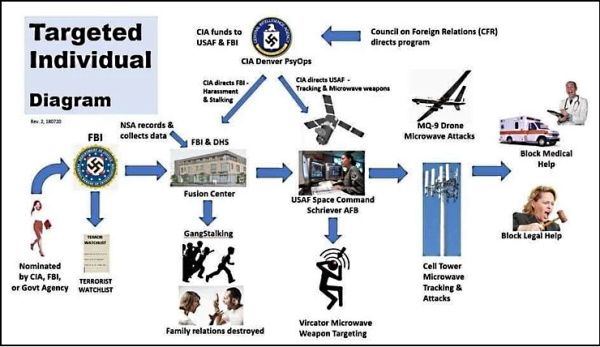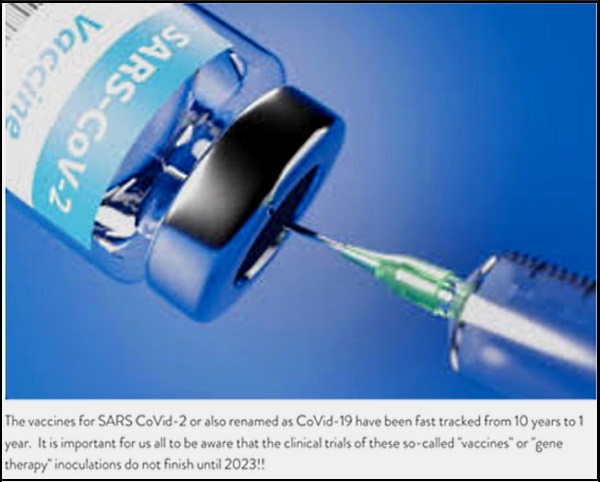by Prof Michel Chossudovsky, Global Research
August 10, 2021
Hell is Empty and the Devils are All Here
~ William Shakespeare, The Tempest, 1610- 1611
Introduction
There is a sequence of outright lies and fabrications used to justify far-reaching policy decisions which in the course of the last 18 months are literally destroying people’s lives Worldwide.
“Fake science” is used to justify confinement, social distancing, the face mask, the prohibition of social gatherings, cultural and sports events, the closure of economic activity, all of which are upheld as a means to repealing the “killer virus”.
Who is this “Killer Virus” which has been personified by both the media and our governments, held responsible for triggering economic and social chaos Worldwide?
You might recall that at the height of the February 2020 financial collapse, “V the Virus” was held responsible for the largest stock market crash since 1929.
Has the “Killer Virus” been Identified. Has SARS-CoV-2 been Isolated?
This article will review this contentious issue starting at the outset of the crisis in January 2020. Part of this analysis is based on research conducted in early 2020.
The central question raised in this review is the following: is there reliable evidence provided by the WHO and national health authorities that the alleged SARS-CoV-2 virus has been isolated/purified from an “unadulterated sample taken from a diseased patient”?
While the alleged virus was initially defined as the 2019 novel coronavirus (2019-nCoV) in January 2020, the World Health Organization (WHO) did not have in its possession details regarding the isolation/purification and identity of 2019-nCoV.
And because details concerning isolation / purification were not available, the WHO decided to “customize” The Real Time Reverse Transcription Polymerase Chain Reaction (rRT-PCR) Test using the alleged “similar” 2003 SARS virus (subsequently renamed SARS-1) as “a point of reference” for detecting genetic fragments of the novel 2019-nCoV.
What this decision entails is that novel 2019-CoV-2 is NOT a novel virus. It was categorized by the Chinese authorities and the WHO as “similar” to the 2003 SARS-CoV as well as to MERS.
2003 SARS-CoV was subsequently renamed SARS-CoV-1.
History: Isolation of the Virus
Chinese Health Authorities
The Chinese authorities announced on January 7, 2020 that “a new type of virus” had been identified “similar to the one associated with SARS and MERS” (related report , not original Chinese government source). The underlying method is described below:
We prospectively collected and analysed data on patients with laboratory-confirmed 2019-nCoV infection by real-time RT-PCR and next-generation sequencing.
Data were obtained with standardised data collection forms shared by WHO and the International Severe Acute Respiratory and Emerging Infection Consortium from electronic medical records. (emphasis added)
The following article entitled “A new coronavirus associated with human respiratory disease in China, (Nature, February 3, 2021) was among the first to report on China’s novel coronavirus:
…[We] collected bronchoalveolar lavage fluid (BALF) and performed deep meta-transcriptomic sequencing. The clinical specimen was handled in a biosafety level 3 laboratory at Shanghai Public Health Clinical Center. Total RNA was extracted from 200 μl of BALF and a meta-transcriptomic library was constructed for pair-end (150-bp reads) sequencing using an Illumina MiniSeq as previously described 4,6,7,8.
In total, we generated 56,565,928 sequence reads that were de novo-assembled and screened for potential aetiological agents.
…
The genome sequence of this virus, as well as its termini, were
determined and confirmed by reverse-transcription PCR (RT–PCR)10 and 5′/3′ rapid amplification of cDNA ends (RACE), respectively. This virus strain was designated as WH-Human 1 coronavirus (WHCV) (and has also been referred to as
‘2019-nCoV’) and its whole genome sequence (29,903 nt) has been assigned GenBank accession number MN908947.
The viral genome organization of WHCV was determined by sequence alignment to two representative members of the genus Betacoronavirus:
a coronavirus associated with humans (SARS-CoV Tor2, GenBank accession number AY274119) [2003] and a coronavirus associated with bats (bat SL-CoVZC45, GenBank accession number MG772933) . (
Nature, February 3, 2020)
It is unclear from the above quotations as well as from the documents consulted, whether the Chinese health authorities undertook an isolation / purification of a patient’s specimen.
US Centre for Disease Control and Prevention (CDC)
Following the Chinese announcement on the 28th of January 2020, the US Centre for Disease Control and Prevention (CDC) stated that the novela corona virus had been isolated. The CDC statement dated January 28th, 2020 (updated December 2020) is unequivocal:
SARS-CoV-2, the virus that causes COVID-19, was isolated in the laboratory and is available for research by the scientific and medical community.
Timeline:
-
- On January 20, 2020, CDC received a clinical specimen collected from the first reported U.S. patient infected with SARS-CoV-2. CDC immediately placed the specimen into cell culture to grow a sufficient amount of virus for study.
- On February 2, 2020, CDC generated enough SARS-CoV-2 grown in cell culture to distribute to medical and scientific researchers.
- On February 4, 2020, CDC shipped SARS-CoV-2 to the BEI Resources Repository.
- An article discussing the isolation and characterization of this virus specimen is available in Emerging Infectious Diseases.
One important way that CDC has supported global efforts to study and learn about SARS-CoV-2 in the laboratory was by growing the virus in cell culture and ensuring that it was widely available. Researchers in the scientific and medical community can use virus obtained from this work in their studies.
SARS-CoV-2 strains supplied by CDC and other researchers can be requested, free, from the Biodefense and Emerging Infections Research (BEI) Resources Repository external icon by established institutions that meet BEI requirements. These requirements include maintaining appropriate facilities and safety programs, as well as having the appropriate expertise. BEI supplies organisms and reagents to the broader community of microbiology and infectious disease researchers. (Emphasis added).

See also related study which was posted on the CDC website.
The CDC Acknowledges that SARS-CoV-2 has not been Isolated.
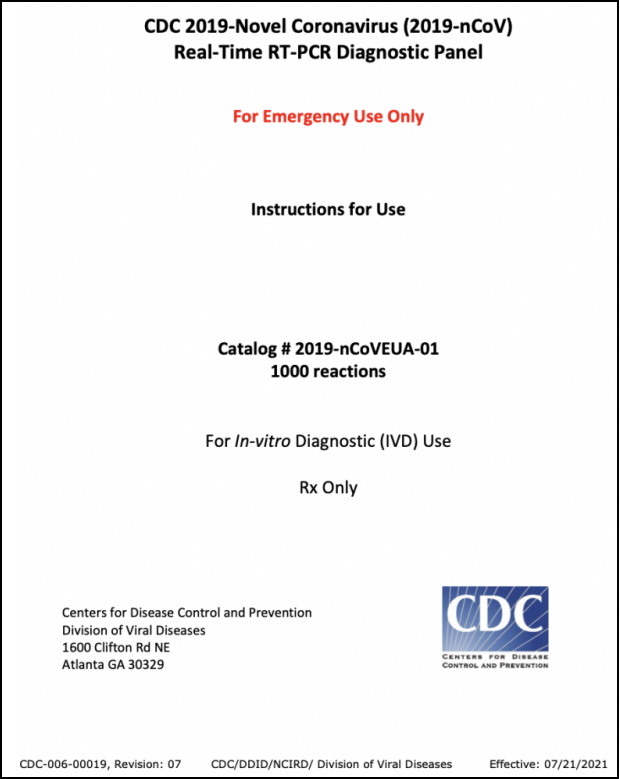
The official CDC document, (dated July 21, 2021) entitled “CDC 2019-Novel Coronavirus (2019-nCoV) Real-Time RT-PCR Diagnostic Panel reads as follows:
Since no quantified virus isolates of the 2019-nCoV were available for CDC use at the time the test was developed [January 2020] and this study conducted, assays designed for detection of the 2019-nCoV RNA were tested with characterized stocks of in vitro transcribed full length RNA (N gene; GenBank accession: MN908947.2) of known titer (RNA copies/µL) spiked into a diluent consisting of a suspension of human A549 cells and viral transport medium (VTM) to mimic clinical specimen. (emphasis added, page 40)
Compare the above statement to the CDC January 28th, 2020 advisory confirming the isolation of SARS-CoV-2:
On January 20, 2020, CDC received a clinical specimen collected from the first reported U.S. patient infected with SARS-CoV-2. CDC immediately placed the specimen into cell culture to grow a sufficient amount of virus for study.
See the analysis of CDC responses in the section below on Freedom of Information Requests.
The World Health Organization (WHO) Did Not Undertake The Isolation / Purification of a Specimen
From the documents quoted below, the Chinese authorities did not provide the WHO with a specimen of isolated / purified SARS-CoV-2.
And because details concerning isolation were not available, the WHO decided to “customize” its Real Time Reverse Transcription Polymerase Chain Reaction (rRT-PCR) test using a so-called isolate of the “similar” 2003 SARS corona virus (subsequently renamed SARS-CoV-1) as “a point of reference” (or proxy) for detecting genetic fragments of the 2019 SARS-CoV-2.
The WHO sought the advice of Victor M. Corman, Christian Drosten, et al of the Berlin Virology Institute at Charité Hospital. The study entitled “Detection of 2019 novel coronavirus (2019-nCoV) by real-time RT-PCR” ) was subsequently submitted to the WHO.
While Corman, Drosten et al’s study confirmed that “several viral genome sequences had been released”, in the case of 2019-nCoV, “virus isolates or samples from infected patients were not available … ”
The recommendations to the WHO were as follows:
“The genome sequences suggest presence of a virus closely related to the members of a viral species termed severe acute respiratory syndrome (SARS)-related CoV, a species defined by the agent of the 2002/03 outbreak of SARS in humans [3,4].
We report on the the establishment and validation of a diagnostic workflow for 2019-nCoV screening and specific confirmation [using the RT-PCR test], designed in absence of available virus isolates or original patient specimens. Design and validation were enabled by the close genetic relatedness to the 2003 SARS-CoV, and aided by the use of synthetic nucleic acid technology.” (Eurosurveillance, January 23, 2020, emphasis added).
What this bold statement suggests is that the isolation / purification of 2019-nCoV was not required and that “validation” would be enabled by “the close genetic relatedness to the 2003-SARS-CoV.”
The recommendations of the Corman- Drosten study (supported and financed by the Gates Foundation) pertaining to the use of the RT-PCR test applied to 2019-nCoV were then firmly endorsed by the Director General of the WHO, Dr. Tedros Adhanom. (For further details see Michel Chossudovsky, E-Book, Chapter II).
Freedom of Information: No Record of SARS-CoV-2 Isolation-Purification
An important ongoing and detailed investigative project by Christine Massey, M.Sc. of Ontario, Canada is entitled:
Freedom of Information Requests: Health/ Science Institutions Worldwide “Have No Record” of SARS-COV-2 Isolation/Purification (work in progress since 2020), by Fluoride Free Peel, August 04, 2021
A related text shows the list of institutions contacted
90 Health/Science Institutions Globally All Failed to Cite Even 1 Record of “SARS-COV-2” Purification, by Anyone, Anywhere, Ever by Fluoride Free Peel, August 04, 2021
The investigative report provides detailed documentation based on Freedom of Information (FOI) requests addressed to ninety Health /Science institutions in a large number of countries.
The responses to these requests confirm that there is no record of isolation / purification of SARS-CoV-2 “having been performed by anyone, anywhere, ever.”
“The 90 Health /Science institutions that have responded thus far have provided and/or cited, in total, zero such records:
Our requests [under “freedom of information”] have not been limited to records of isolation performed by the respective institution, or limited to records authored by the respective institution, rather they were open to any records describing “COVID-19 virus” (aka “SARS-COV-2”) isolation/purification performed by anyone, ever, anywhere on the planet.”
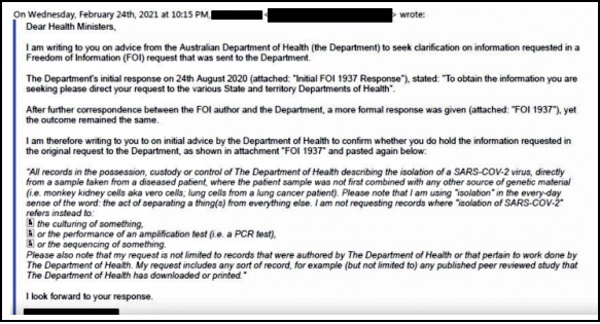
The Centre for Disease Control and Prevention (CDC)
The CDC was contacted by the author of this report in the form of four separate requests: November 2, 2020, March 1, 2021, March 3, 2021, which are reviewed below:
On November 2, 2020.
The CDC admitted they have no records of actual isolation/purification by anyone, anywhere, ever, by any method” :
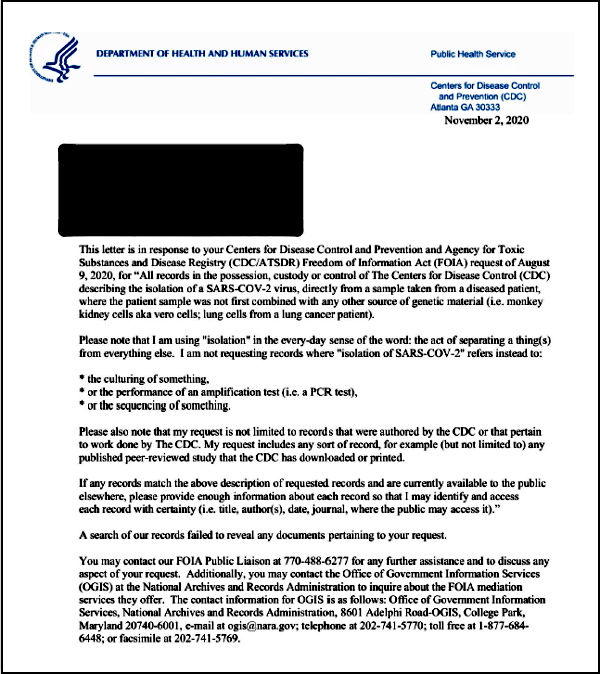
The CDC again made clear that they still have no records of “SARS-COV-2” isolation performed by anyone, anywhere on the planet, ever… just not in so many words. Instead, the CDC absurdly implied that isolation/purification of “SARS-COV-2” would require the replication of a “virus” without host cells and thus is impossible. (The request had nothing to do with replication.)
..
https://www.fluoridefreepeel.ca/wp-content/uploads/2021/03/CDC-March-1-2021-SARS-COV-2-Isolation-Response-Redacted.pdf
CDC again failed to provide/cite any records describing “SARS-COV-2” isolation/purification by anyone anywhere ever… but would no longer simply say so (as they did on November 2nd); instead they gave song and dance citing the study by Harcourt et al. which is the same one posted on CDC’s website:
https://www.fluoridefreepeel.ca/wp-content/uploads/2021/03/CDC-March-3-2021-SARS-COV-2-purification-FOI-response.pdf
June 7, 2021:
CDC admitted they have no record of “SARS-COV-2” purification from a patient sample via maceration, filtration and use of an ultracentrifuge, by anyone, anywhere, ever:
https://www.fluoridefreepeel.ca/wp-content/uploads/2021/06/CDC-FOIA-request-response-no-records-SARS-COV-2-purification.pdf
Conclusive Results of the Investigation
What the author of this incisive and detailed report has confirmed is that:
Every institution has failed to provide even 1 record describing the isolation aka purification of any “COVID-19 virus” directly from a patient sample that was not first adulterated with other sources of genetic material. (Those other sources are typically monkey kidney aka “Vero” cells and fetal bovine serum).
Here are 5 compilation pdfs containing FOI responses from 79 institutions in 22 countries/jurisdictions, re the isolation/purification/existence of “SARS-COV-2”, as well as emails from authors of studies that claimed to have “isolated the virus” and an email from the Head of the Consultant Laboratory for Diagnostic Electron Microscopy of Infectious Pathogens at Germany’s Robert Koch Institut, last updated July 13, 2021
Screenshot of a selected responses are provided below : New Zealand, Canada, UK.
Consult the full archive of letters and responses. This work was undertaken over a period of more than 12 months.
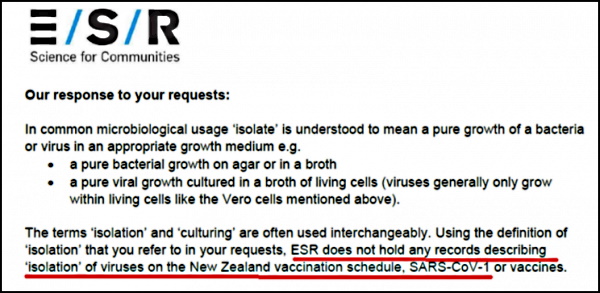
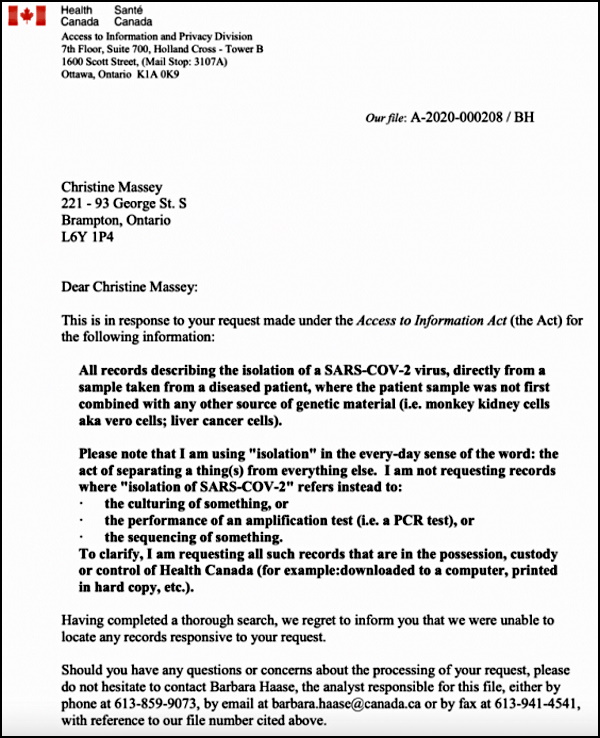
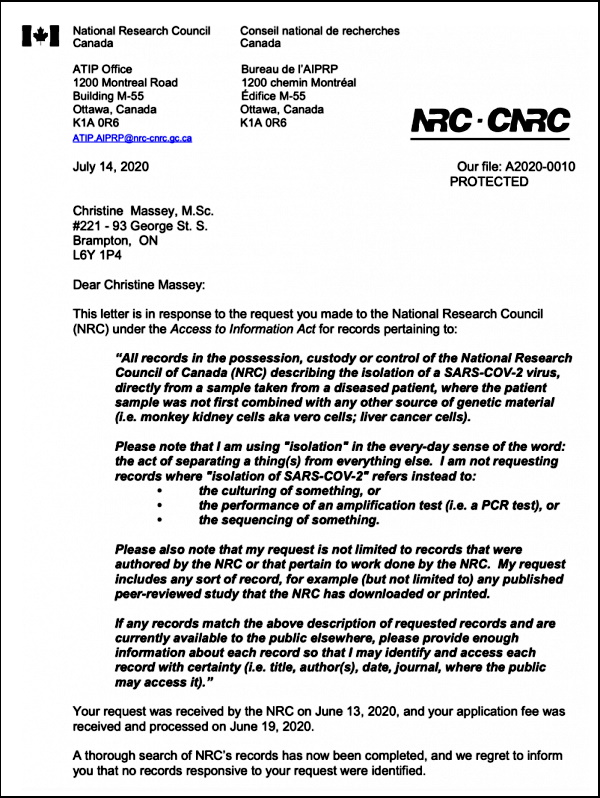
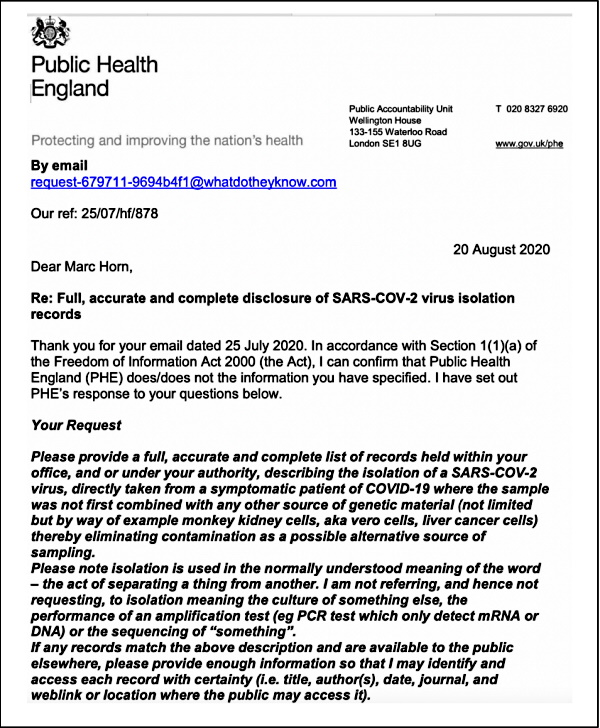
Response Public Health England
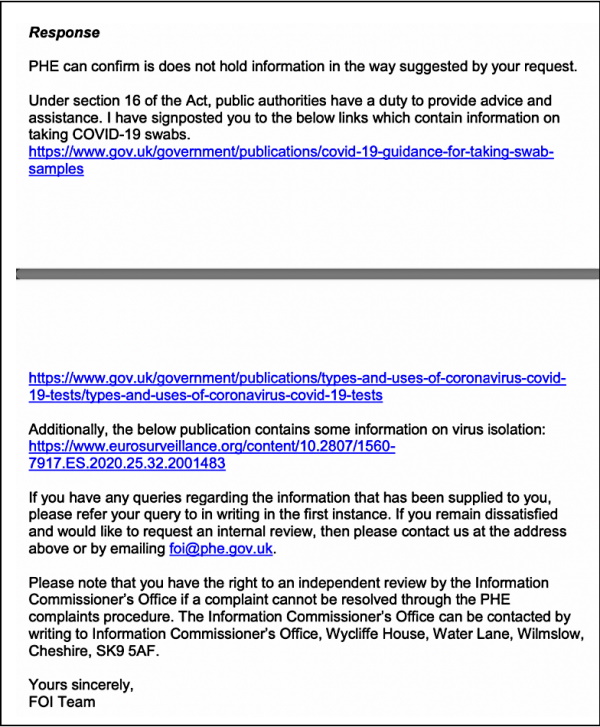
It follows from the above detailed study that there is no evidence that the SARS-CoV-2 virus has been isolated/purified from a patient’s sample, as evidenced by the responses “under freedom of information” (FOI) from some 90 health / science institutions Worldwide.
Thus far (July 9, 2021) 27 Canadian institutions have provided their responses. (click to access list)
Republic of Ireland: “The Virus does not Exist”
Gemma O’Doherty is an Investigative Journalist in Ireland.
“This Irish Investigation into Covid shows that The Department of Health refuses to confirm the existence of a “virus” in writing. Confirmation that the virus was never isolated.”
VIDEO:
“As part of our legal action we had been demanding the evidence that this virus actually exists [as well as] evidence that lock downs actually have any impact on the spread of viruses; that face-masks are safe, and do deter the spread of viruses – They don’t. No such studies exist; that social distancing is based in science – It isn’t. it’s made up; that contact tracing has any bearing on the spread of a virus – of course it doesn’t. This organization here – is making it up as they go along.” – Gemma O’Doherty
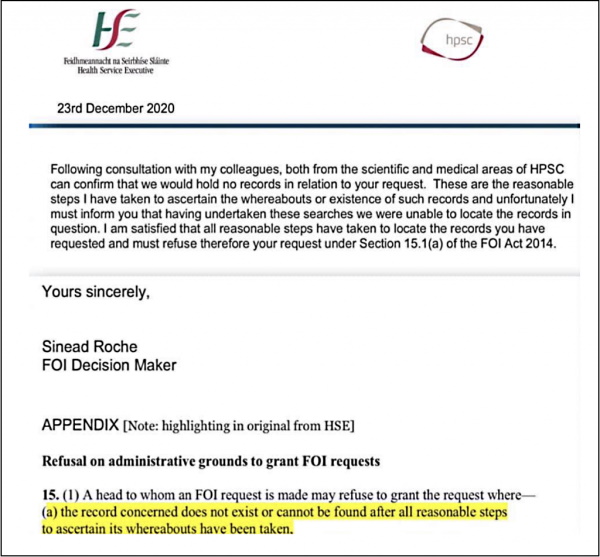
Isolation of the Virus. The Legal Battle in Alberta. Patrick King
Patrick King. The Virus Has Not Been Isolated! “No I Did Not Win The Court Case”. “They Do Not Have the Evidence”.
The following video features Patrick King in his legal Battle against the Alberta Government.
There are a lot of people in Alberta and around the World who are Fighting against the Big Lie.
Video: Patrick King embodies the Truth.
Concluding Remarks: “Biggest Medical Fraud in World History”
SARS-CoV-2 has not been isolated. Does the virus Exist?
Neither the Chinese authorities nor the CDC, the WHO, national governments, scientific / health authorities have provided evidence that SARS-CoV-2 has been isolated /purified.
Based on the investigative research of Christine Massey we have access to the responses of numerous governments and health authorities, including that provided by the Republic of Ireland to journalist Gemma O’Doherty.
What this means is that the entire covid narrative falls flat.
We have been systematically misled.
Everything you have been told by your governments is a lie, a complexity of lies and falsehoods.
There is no pandemic. The isolation / purification of the virus has not been undertaken.
All the policies adopted by governments worldwide allegedly to “save lives” are illegal, socially destructive and in violation of fundamental human rights.
These policies have been instrumental in “destroying people’s lives”.
Dr. Stephen Frost refers to the alleged “Covid pandemic” as “The Biggest Medical Fraud in World History”.
From the outset in January 2020, the flawed and invalid RT-PCR test was used to “detect” the alleged 2019 SARS-CoV-2 virus, despite the fact that details regarding the isolation/purification of the original virus were not available.
All far-reaching policy decisions imposed on people Worlwide were based on a data bank of fake case positives coupled with false mortality data pertaining to Covid-19 related deaths.
Curbing the alleged SARS-CoV-2 pandemic through the imposition of face masks, social distancing, closing down of national economies has absolutely no validity,
The original strain of SARS-CoV-2 has not be isolated /purified: How does that affect the process of so-called “detection” of the “deadly variants” of the original virus?
Mortality and Morbidity: While there is “No Killer Virus”, there is a “Killer Vaccine”.
While the SARS-CoV-2 virus is presented by the media and the governments as a “killer virus” (when in fact the WHO and CDC describe it as “similar to seasonal influenza”), a totally invalid and dysfunctional Covid -19 vaccine is currently being imposed on the entire population of Planet Earth: 7.9 billion people.
It’s a multibillion dollar endeavour with Pfizer in the lead, establishing a near Worldwide monopoly for the sale and distribution of the mRNA killer vaccine.
Important Question:
How did Big Pharma manage to develop a vaccine (sponsored by the WHO, GAVI, the Gates Foundation, et al) with a mandate “to protect people” against a virus which has not been isolated/ purified from an “unadulterated sample taken from a diseased patient”?
Vaccine in relation to What? The virus has not been identified.
Moreover, 2019 SARS-CoV-2 has been categorized as similar to the 2003 SARS-CoV which means that the 2019 SARS-CoV-2 is not a novel virus.
The legitimacy of the Covid vaccine project hinges upon the validity of hundreds of thousands of RT-PCR fake positive cases Worldwide combined with fake Covid related mortality data.
Big Pharma’s mRNA vaccine has resulted in countless deaths and injuries Worldwide which are barely reported by the mainstream media.
While we do not have figures for the entire Planet, the latest official figures for the European Union and the U.S are revealing. Bear in mind they vastly underestimate the real trends in vaccin related mortality and morbidity:
EU/EEA/Switzerland to 31 July 2021 – 20,595 Covid-19 injection related deaths and over 1.94 million injuries, per EudraVigilance Database.
UK to 21 July 2021 – 1,517 Covid-19 injection related deaths and over 1.1 million injuries, per MHRA Yellow Card Scheme.
USA to 23 July 2021 – 11,940 Covid-19 injection related deaths and over 2.4 million injuries, per VAERS database.
TOTAL for EU/UK/USA – 34,052 Covid-19 injection related deaths and over 5.46 million injuries reported as at 1 August 2021
Nota Bene: It is important to be aware that the official figures above (reported to the health authorities) are but a small percentage of the actual figures. Furthermore, people continue to die (and suffer injury) from the injections with every day which passes. (D4CE)
So why are governments pressuring people to get vaccinated?
Heads of State and heads of government Worldwide are being pressured, bribed, coopted and/or threatened by powerful financial interests into accepting the Covid vaccine consensus. The vaccine passport is the endgame, which constitutes a transition towards digital tyranny.
The study and reports analyzed in this article should be used to confront politicians as well as inform and sensitize people in towns and villages, across the land, nationally and internationally.
At this stage in our history, solidarity is absolutely fundamental.
Does the Virus Exist?
The governments and the WHO do not have a Leg to Stand On. And neither does Bill Gates.
What we must seek is to confront a very fragile covid-19 consensus, which is based on fraud and deceit.
Author’s Note. I remain indebted to Christine Massey for her extensive research and investigation on the issue of isolation /purification.
See also Michel Chossudovsky’s E-book (10 chapters) entitled:
The 2020-21 Worldwide Corona Crisis: Destroying Civil Society, Engineered Economic Depression, Global Coup d’État and the “Great Reset” by Prof Michel Chossudovsky,
Michel Chossudovsky is an award-winning author, Professor of Economics (emeritus) at the University of Ottawa, Founder and Director of the Centre for Research on Globalization (CRG), Montreal, Editor of Global Research.
He has undertaken field research in Latin America, Asia, the Middle East, sub-Saharan Africa and the Pacific and has written extensively on the economies of developing countries with a focus on poverty and social inequality. He has also undertaken research in Health Economics (UN Economic Commission for Latin America and the Caribbean (ECLAC), UNFPA, CIDA, WHO, Government of Venezuela, John Hopkins International Journal of Health Services (1979, 1983)
He is the author of twelve books including The Globalization of Poverty and The New World Order (2003), America’s “War on Terrorism (2005), The Globalization of War, America’s Long War Against Humanity (2015).
He is a contributor to the Encyclopaedia Britannica. His writings have been published in more than twenty languages. In 2014, he was awarded the Gold Medal for Merit of the Republic of Serbia for his writings on NATO’s war of aggression against Yugoslavia.
Connect with Global Research
cover image credit: Syaibatulhamdi / pixabay
